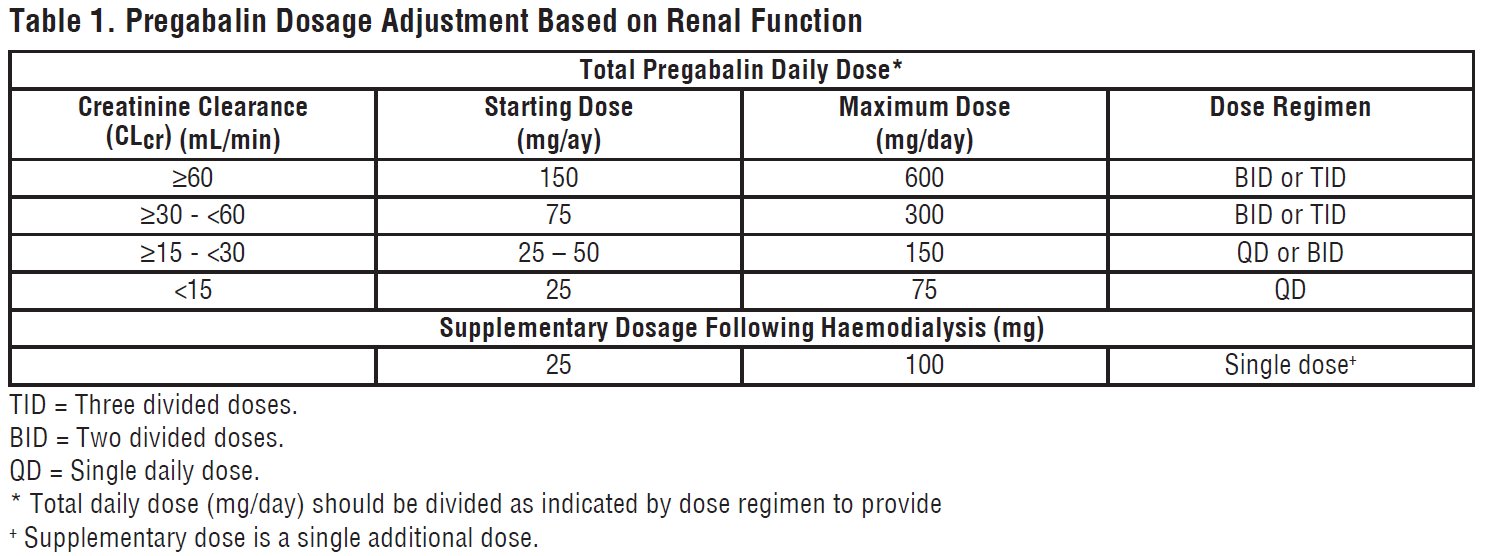Regulatory Information
HSA regulatory responsibility and product classification details
Regulatory Responsibility
Product Classification
Formulation Information
CAPSULE
**4.2 Posology and method of administration** The dose range is 150 to 600 mg per day given in either two or three divided doses. Pregabalin may be taken with or without food. Neuropathic pain Pregabalin treatment can be started at a dose of 150 mg per day. Based on individual patient response and tolerability, the dosage may be increased to 300 mg per day after an interval of 3 to 7 days, and if needed, to a maximum dose of 600 mg per day after an additional 7-day interval. Epilepsy Pregabalin treatment can be started with a dose of 150 mg per day. Based on individual patient response and tolerability, the dosage may be increased to 300 mg per day after 1 week. The maximum dosage of 600 mg per day may be achieved after an additional week. Generalised anxiety disorder The dose range is 150 to 600 mg per day given as two or three divided doses. The need for treatment should be reassessed regularly. Pregabalin treatment can be started with a dose of 150 mg per day. Based on individual patient response and tolerability, the dosage may be increased to 300 mg per day after 1 week. Following an additional week, the dosage may be increased to 450 mg per day. The maximum dosage of 600 mg per day may be achieved after an additional week. Fibromyalgia The recommended dose of pregabalin is 300 to 450 mg per day. Dosing should begin at 75 mg two times a day (150 mg per day) and may be increased to 150 mg two times a day (300 mg per day) within 1 week based on efficacy and tolerability. Patients who do not experience sufficient benefit with 300 mg per day may be further increased to 225 mg two times a day (450 mg per day). Although pregabalin was also studied at 600 mg per day, there is no evidence that this dose confers additional benefit and that this dose was less tolerated. In view of the dose-dependent adverse reactions, treatment with doses above 450 mg per day is not recommended. Discontinuation of pregabalin If pregabalin has to be discontinued, it is recommended this should be done gradually over a minimum of 1 week independent of the indication. _Patients with renal impairment_ Dosage reduction in patients with compromised renal function must be individualised according to creatinine clearance (CLcr) (see **Pharmacokinetic properties**, Pharmacokinetics in special patient groups, Renal impairment – _please refer to the Product Insert/Patient Information Leaflet published on HSA for the full drug information_), as indicated in Table 1 determined using the following formula:  For patients receiving haemodialysis, the pregabalin daily dose should be adjusted based on renal function. In addition to the daily dose, a supplementary dose should be given immediately following every 4-hour haemodialysis treatment (see Table 1).  _Use in patients with hepatic impairment_ No dosage adjustment is required for patients with hepatic impairment (see **Pharmacokinetic properties**, Pharmacokinetics in special patient groups, Hepatic impairment – _please refer to the Product Insert/Patient Information Leaflet published on HSA for the full drug information_). _Use in children and adolescents (12 to 17 years of age)_ The safety and effectiveness of pregabalin in paediatric patients below the age of 12 years and adolescents have not been established. The use in children and adolescents is not recommended (see **Preclinical safety data** – _please refer to the Product Insert/Patient Information Leaflet published on HSA for the full drug information_). _Use in the elderly (over 65 years of age)_ Elderly patients may require a dose reduction of pregabalin due to decreased renal function (see **Pharmacokinetic properties**, Pharmacokinetics in special patient groups, Elderly (over 65 years of age) – _please refer to the Product Insert/Patient Information Leaflet published on HSA for the full drug information_).
ORAL
Medical Information
**4.1 Therapeutic indications** Neuropathic pain Pregabalin is indicated for the treatment of neuropathic pain, which includes diabetic peripheral neuropathy and post-herpetic neuralgia, in adults. Epilepsy Pregabalin is indicated as adjunctive therapy of partial seizures, with or without secondary generalisation, in adults. Generalised anxiety disorder Pregabalin is indicated for the treatment of Generalised Anxiety Disorder (GAD) in adults. Fibromyalgia Pregabalin is indicated for the management of fibromyalgia.
**4.3 Contraindications** Hypersensitivity to the active substance or to any of the excipients.
N02BF02
pregabalin
Manufacturer Information
GOLDPLUS UNIVERSAL PTE LTD
Jubilant Generics Limited
Active Ingredients
Documents
Package Inserts
Lyrijub Capsule PI.pdf
Approved: May 30, 2023
